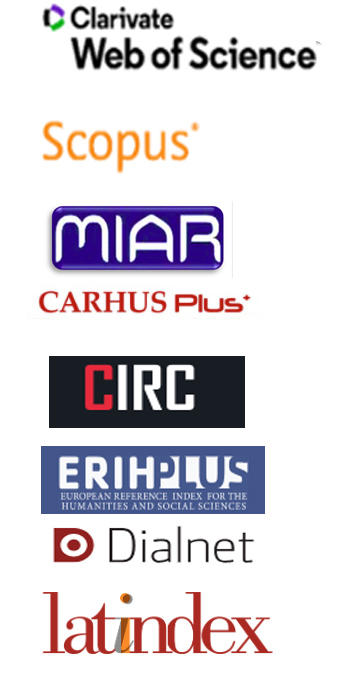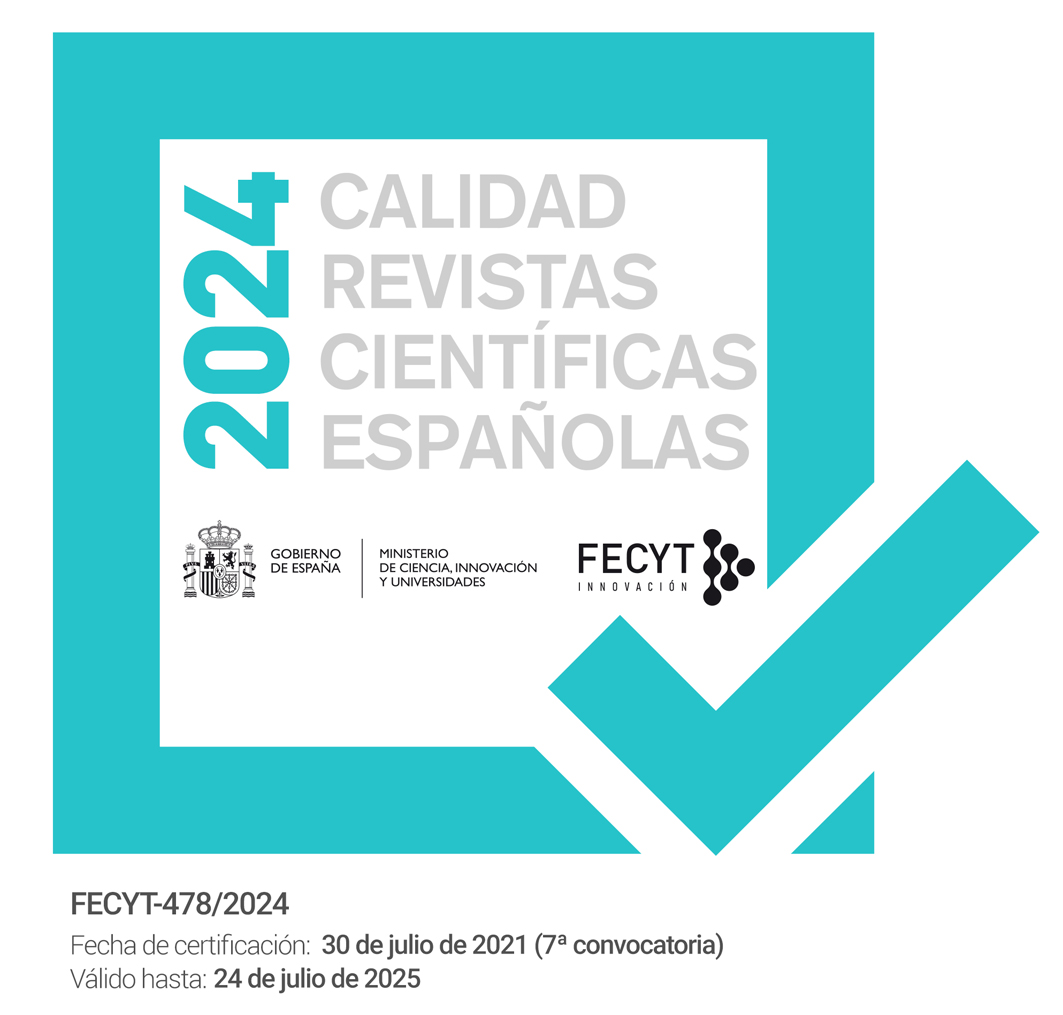De la Industria a la Creatividad y las Artes: Análisis de tendencias culturales en la reconfiguración y gestión cultural de espacios industriales en Lisboa
Resumen
Este artículo explora la transformación de antiguos sitios de patrimonio industriales urbanos en Lisboa en ecosistemas creativos, a la luz de las principales tendencias culturales y mentalidades que están cambiando la ciudad. Analizamos la dinámica actual, los proyectos y la naturaleza de estos nuevos sitios y cómo han sido impactados por los cambios socioculturales y destacamos su base patrimonial. Basado en una triangulación cultural aplicada a cuatro espacios, nuestros resultados apuntan a un gran impacto de las tendencias culturales en el desarrollo de comunidades creativas en antiguos sitios de patrimonio industriales, principalmente en términos de proyectos de identidad, creación de historias, dinámicas de co-creación e intercambio del conocimiento para soluciones innovadoras. Este artículo contribuye con una nueva perspectiva sobre la red creativa de Lisboa; una comprensión del papel del patrimonio en la reconfiguración de sitios industriales en comunidades creativas; ofrece un marco metodológico para avanzar en la investigación sobre el análisis de tendencias en un entorno aplicado de espacios culturales y creativos, proporcionando una herramienta de auditoría de su naturaleza, proyectos y dinámicas.
Descargas
Citas
AUGÉ, M. (1995). Non-Places: Introduction to an Anthropology of Supermodernity. London: Verso.
BURAWOY, M. (1998). “The Extended Case Method”, Sociological Theory, 16 (1).
CANTU, W., LOPES, C., GOMES, N. and PRADO, G. (2019). “The Gaze of Culture and Communication”. In Proceedings of the 6th Doctoral Design Conference | DDC’19: TRANSformation, DUARTE, E. (ed.), Lisboa: Edições IADE, 197–203.
CUNHA, P. (2003). “Cidade e programação cultural. O caso do Porto em 2001”, Sociologia, 13: 131–138.
DRAGT, E. (2017). How to Research Trends. Amsterdam: BIS Publishers.
EBEWO, P. and SIRAYI, M. (2009). “The concept of arts/cultural management: A critical reflection”, Journal of Arts Management Law and Society, 38: 281–295. https://doi.org/10.3200/JAML.38.4.281-295.
EDWARDS, J. and COIT, J. (1996). “Mines and Quarries. Industrial Heritage Tourism”, Annals of Tourism Research, 23 (2). https://doi.org/10.1016/0160-7383(95)00067-4.
FORNAS, J. (2000). “The crucial in between: the centrality of mediation in cultural studies”, European Journal of Cultural Studies, 3 (1): 45–65. https://doi.org/10.1177/a010862.
GIL, A. (2008). Métodos e Técnicas de Pesquisa Social. São Paulo: Atlas.
GOMES, N., COHEN, S., CANTÚ, W. and LOPES, C. (2021). “Roteiros e modelos para a identificação de tendências socioculturais e a sua aplicação estratégica em produtos e serviços”, Modapalavra E-Periódico, 14 (32): 228–272. https://doi.org/10.5965/1982615x14322021228.
GOMES, N., COHEN, S. and FLORES, A. (2018). “Estudos de Tendências: contributo para uma abordagem de análise e gestão da cultura”, ModaPalavra, 11(22): 049–112. https://doi.org/10.5965/1982615x11222018049.
GOMES, N. (2019). “Gestão da Cultura: estratégia e articulações no âmbito do branding e das tribos urbanas”, E-revista Logo, 8 (2).
GONÇALVES, S., GONÇALVES, J. and MARQUES, C. (2021). Manual de Investigação Qualitativa, Primeira. Lisboa: PACTOR - Edição de Ciências Sociais, Forenses e de Educação.
HOLT, D. and CAMERON, D. (2010). Cultural Strategy – using innovative ideologies to build breakthrough brands. Oxford: Oxford Press.
HALL, S. (ed.) (1997). Representation: Cultural Representations and Signifying Practices: London: SAGE & The Open University.
HIGHAM, W. (2009). The Next Big Thing. London: Kogan Page.
KONGSHOLM, L. and FREDERIKSEN, C. (2018). Trend Sociology V. 2.0. Hernin: Pej Gruppen.
LAKATOS E. and MARCONI, M. (1992). Metodologia Do Trabalho Científico. São Paulo: Editora Atlas.
LANGE, B., HARDING, S. and CAHILL-JONES, T. (2019), “Collaboration at New Places of Production: a European View on Procedural Policy Making for Maker Spaces”, European Journal of Creative Practices in Cities and Landscapes, 2 (2): 63–81. https://doi.org/10.6092/issn.2612-0496/9556.
MARTIN, B. and HANINGTON, B. (eds.) (2018). The Pocket Universal Methods of Design. Berverly: Rockport Publishers.
McCRACKEN, G. (2008). Chief Culture Officer. New York: Basic Books.
McINTOSH, A. and PRENTICE, R. Affirming Authenticity. Consuming Cultural Heritage. Annals of Tourism Research, 26 (3). https://doi.org/10.1016/S0160-7383(99)00010-9.
POWERS, D. (2019). Trends – The business of Forecasting the Future. Chicago: University of Illinois Press.
RODRIGUES, L.A. (2008). “Gestão cultural e seus eixos temáticos”, In Políticas Públicas de Cultura Do Estado Do Rio de Janeiro, Curvello, M.A. (ed.), Rio de Janeiro: UERJ/DECULT, 76–93.
TEIXEIRA, P. and NETO, J. (2017). “Uma proposta de tipologia para pesquisas de natureza interventiva”, Ciência & Educação, 23 (4): 1055–1076. https://doi.org/10.1590/1516-731320170040013.
VEJLGAARD, H. (2008). Anatomy of a Trend. New York: McGraw-Hill.
- Los autores conservan los derechos de autor y propiedad intelectual, y garantizan a la revista Ge-Conservación y al GEIIC el Copyright© de los derechos de edición y publicación por cualquier medio y soporte. Las obras de dichos autores además se pueden publicar bajo una Creative Commons Attribution License que autoriza ser distribuido gratuitamente, copiado y exhibido por terceros si se muestra en los créditos la autoría y procedencia original en esta revista, y no se puede obtener ningún beneficio comercial por parte de terceros, ni tampoco se pueden realizar obras derivadas.
- Los artículos podrán ser utilizados para fines científicos y formativos, pero nunca con fines comerciales, expresamente sancionado por la Ley.
- La información contenida en los artículos es responsabilidad exclusiva de los autores.
- La revista Ge-Conservación y los autores pueden establecer por separado acuerdos adicionales para la distribución no exclusiva de la versión de la obra publicada en la revista (por ejemplo, situarlo en un repositorio institucional o publicarlo en un libro), con un reconocimiento de su publicación inicial en esta revista.
- Se permite y se anima a los autores a difundir sus trabajos electrónicamente (por ejemplo, en repositorios institucionales o en su propio sitio web) después de su publicación en la revista Ge-Conservación, ya que puede dar lugar a intercambios productivos, así como a una citación más temprana y mayor de los trabajos publicados por el autor.
- Los datos personales suministrados por los autores únicamente serán utilizados para los fines de la revista y no serán proporcionados a terceros.









